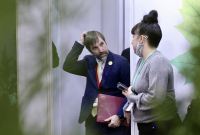Canada ups the ante on climate funding amid fears other wealthy nations will backslide

With a climate change summit kicking off this week in Belgium, Environment and Climate Change Minister Steven Guilbeault announced on Wednesday that Canada is contributing $450 million to a fund to support developing countries in paying for climate action.
The nearly half-billion-dollar contribution is being deposited in the Green Climate Fund (GCF) — the world’s largest fund used to implement the Paris Agreement’s goals. The money is a 50 per cent increase from the $300-million contribution Canada previously made in 2019 during the GCF’s first fundraising period but falls short of the $600 million civil society groups have pushed Canada to contribute for its second fundraising round. The $450 million is also not new money but, rather, part of a $5.3-billion commitment, spread over five years, to international climate finance that Canada made in 2021.
Destination Zero executive director and member of Canada’s Net-Zero Advisory Body Catherine Abreu said in a statement the most interesting part of the funding announcement was its timing, given Canada is co-hosting the Ministerial on Climate Action (MoCA) summit in Brussels alongside the European Union and China.
“Canada can now play a key role in encouraging fellow donor countries to step up and provide the finance that's necessary to unlock climate ambition in advance of COP28” — the United Nations’ yearly climate summit, she said. “While it's a good faith move for Canada to increase its GCF pledge by 50 per cent, the amount of money Canada has put on the table falls short of the call on donor countries to double their investments — we can do more.”
Due to Canada’s extreme fossil fuel use and historic emissions, the country’s fair share of climate finance is estimated at roughly $5.2 billion per year, according to a 2019 analysis from Climate Action Network Canada.
“Would I like Canada to put even more money on the table?” Guilbeault asked rhetorically in response to a question about the country’s fair share. “I mean, I'm the environment and climate change minister; I'm not the finance minister, unfortunately, but I think we can always do better.”
Climate Action Network Canada senior international policy analyst Pratishtha Singh told Canada’s National Observer the country’s $450-million contribution to the GCF is “reasonable” despite falling short of the country’s fair share because it’s a “step in the right direction.”
“It would be impossible to build global co-operation ... without sufficient finance,” she said. Further, by using the MoCA summit to announce funds, Canada is attempting to draw attention to the issue of climate finance ahead of COP28 later this year.
This year, the COP28 presidency is held by the United Arab Emirates, where the head of the petro state’s national oil company has been tapped to lead negotiations. The UAE is using the opportunity to pry into communications with the UN climate office and promote ongoing fossil fuel extraction. Singh said with five months left before the summit, there’s a “vacuum of leadership.”
“So I think Canada has an opportunity there to help countries shift beyond their current fixed positions,” she said.
Experts widely agree providing financial help to developing countries is essential to lowering emissions in places where governments can’t afford to do so. When a rich country puts money on the table, it signals to rich and poor countries alike a genuine commitment to climate action. Conversely, when it takes money off the table, the signal is a lack of commitment to lowering the planet’s emissions and disinterest in co-operating with countries that bear the brunt of climate change.
Beyond demonstrating a commitment to climate negotiations, the announcement is also aimed at countries like the U.K. that are considering backsliding from previous commitments and thus jeopardizing ongoing negotiations, insiders and close observers say.
Roughly two weeks ago, Guilbeault’s U.K. counterpart Zac Goldsmith resigned from his post as international environment minister, claiming Prime Minister Rishi Sunak was “uninterested” in environmental issues. Goldsmith and Guilbeault often emphasized the two countries' “high ambition” in the negotiations. At the UN biodiversity conference in Montreal in December, Guilbeault told Canada’s National Observer he’d “probably spent more time with my U.K. counterpart than any other,” despite Goldsmith coming from a “right-wing populist government.”
Sunak had just taken the reins roughly a month earlier from former prime minister Boris Johnson, who Guilbeault said at the time was still generally “pro-climate, pro-nature.” But under Sunak, the U.K.’s stance on climate appears to be changing. His government is plotting new oilfields as he calls critics “eco-zealots.” Media reports have detailed how the U.K.’s climate leadership is unravelling under his watch.

For Guilbeault, Goldsmith’s resignation represents the loss of a key ally as he attempts to increase Canadian influence on international climate and biodiversity negotiations.
During Wednesday’s funding announcement, Guilbeault did not explicitly name the U.K., but did say: “Money talks. We encourage other contributors, traditional and new, to use this second replenishment of the Green Climate Fund to raise their ambition.”
GCF executive director Henry Gonzalez applauded Canada’s funding announcement and echoed Guilbeault, saying that he, too, hopes “other countries will be inspired and increase their support.”






Comments
Canada of course can't really "backslide" because we never front-slid in the first place.
(in terms of our own climate action. I'm sure it's exemplary that we're giving other countries some money to do the things we refuse to do ourselves)